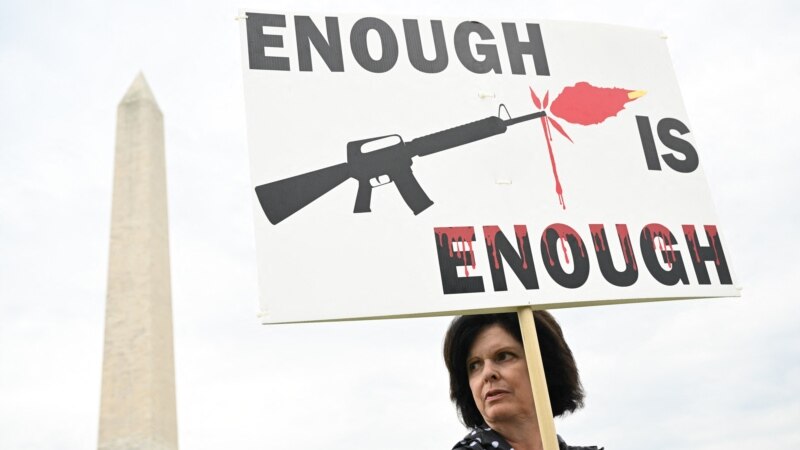
A politically bipartisan group of 20 U.S. senators said Sunday they have reached agreement on tightening gun control laws in the United States, bolstering school security and funding more mental health care in the immediate aftermath of three mass shooting attacks that horrified many Americans.
“We have a deal… that will save lives,” Democratic Senator Chris Murphy of Connecticut said of the pact reached by 10 Democrats and 10 Republicans. If approved by Congress, it would be the first legislative agreement in 30 years to try to curb rampant gun violence in the U.S.
“I think you’ll be surprised at the scope of our framework,” Murphy said, although the deal does not include, as called for by President Joe Biden, a ban on the sale of rapid-fire assault weapons that have often been the weapon of choice deployed by mass shooters in the U.S.
Murphy worked with Democratic Senator Krysten Sinema of Arizona as well as Republican Senators John Cornyn of Texas and Thom Tillis of North Carolina as lead negotiators in crafting the legislation.
Biden said in a statement that the framework “does not do everything that I think is needed, but it reflects important steps in the right direction, and would be the most significant gun safety legislation to pass Congress in decades.”
Given the bipartisan support, “there are no excuses for delay, and no reason why it should not quickly move through the Senate and the House,” he said.
Senate Majority Leader Chuck Schumer of New York called the accord “a good first step to ending the persistent inaction to the gun violence epidemic.” Senate Minority Leader Mitch McConnell of Kentucky, who has supported the talks, released a statement Sunday, saying he is hoping for a deal that makes “significant headway on key issues like mental health and school safety, respects the Second Amendment, earns broad support in the Senate, and makes a difference for our country.”
Schumer said he would bring the measure to a vote as soon as possible.
The lawmakers negotiated the details over the past three weeks in the aftermath of three shocking mass killings that drew widespread attention among many other less publicized assaults that occur weekly in the U.S., violence that is not commonplace elsewhere throughout the world.
In one instance, 10 Black people were gunned down in a racist-inspired attack at a Buffalo, New York, grocery store, while 19 schoolchildren and their two teachers were killed inside an elementary school in Uvalde, Texas, and four people were shot to death at a Tulsa, Oklahoma, medical facility.
Lawmakers in the U.S. have for years been stalemated on new gun sale restrictions, with Democrats almost uniformly calling for tighter curbs and Republicans opposing them, saying any new laws would impinge on Americans’ right to own guns as enshrined in the U.S. Constitution.
Sunday’s pact is notable in that 10 Republicans agreed to it. In the past, 41 or more Republicans have opposed gun control legislation, leaving the 50-member Democratic caucus short of the 60-vote supermajority they have needed in the 100-member Senate to overcome a Republican filibuster against new gun restrictions.
“Drafting this law and passing it through both chambers will not be easy,” Murphy said. “We have a long way before this gets to the president’s desk” for Biden’s signature.
But he added, “We can get this done. This time, failure cannot be an option.”
He said the agreement would provide unspecified “major funding to help states pass and implement crisis intervention orders (red-flag laws) that will allow law enforcement to temporarily take dangerous weapons away from people who pose a danger to others or themselves.”
Murphy said there would be “billions in new funding for mental health and school safety, including money for the national build-out of community mental health clinics.” He said the legislation would “close the ‘boyfriend loophole,’ so that no domestic abuser — a spouse or a serious dating partner — can buy a gun if they are convicted of abuse against their partner.”
He said the legislation would include a prohibition against people buying guns for others and enhance background checks for gun buyers under 21. Both the Buffalo and Uvalde mass shootings were carried out by 18-year-olds.
In addition, Murphy said the law, if approved by Congress, would clarify “who needs to register as a licensed gun dealer, to make sure all truly commercial sellers are doing background checks.”
Murphy, who often has lost efforts in years past to stiffen gun control laws after earlier mass shootings, gave his own assessment of the changes he hopes will be enacted.
“Will this bill do everything we need to end our nation’s gun violence epidemic? No,” he said. “But it’s real, meaningful progress. And it breaks a 30-year logjam, demonstrating that Democrats and Republicans can work together in a way that truly saves lives.”
Some information in this article came from Reuters and The Associated Press.
